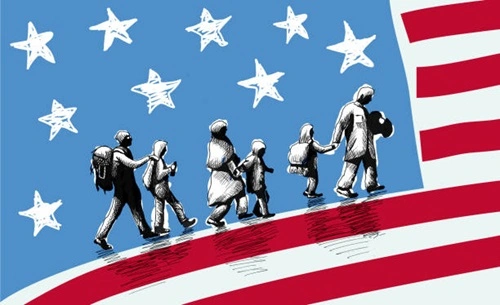In a significant development amidst ongoing negotiations between India and the United States, the Indian government has reiterated its stance on the repatriation of illegal immigrants. India has made it clear that it will only take back individuals identified as illegal immigrants from the U.S. after thoroughly verifying their nationality.
This statement comes in response to diplomatic efforts by the United States to expedite the deportation process of individuals who have allegedly overstayed their visas or entered the country illegally and claim Indian nationality. The issue has become a point of contention as both nations navigate complex immigration challenges while striving to maintain robust bilateral ties.
India’s Verification-First Policy

India’s Ministry of External Affairs (MEA) has emphasized the need for a meticulous verification process before accepting individuals back into the country. Officials have stated that this approach is essential to ensure that only Indian nationals are repatriated, preventing wrongful deportations and addressing concerns about the accuracy of U.S. immigration records.
“India has always cooperated with the United States on immigration matters, but it is imperative to confirm the nationality of each individual before they are repatriated,” a senior government official stated. “We cannot accept individuals without a proper verification process to confirm their citizenship.”
The verification process involves cross-referencing U.S.-provided data with India’s records, including passports and other identification documents. This method ensures that those being deported are indeed Indian nationals and not individuals mistakenly identified as such.
The U.S. Perspective
From the U.S. standpoint, the issue of illegal immigration remains a pressing concern, with the Biden administration seeking greater cooperation from countries like India to streamline deportations. The U.S. Department of Homeland Security has been urging partner nations to expedite the repatriation of individuals who have violated immigration laws.
Indian nationals are among the largest immigrant groups in the United States, and while the vast majority reside legally, a smaller segment has faced issues related to visa overstays or unlawful entry. According to U.S. immigration authorities, the backlog of individuals awaiting deportation includes a significant number who claim Indian nationality.
The U.S. has expressed frustration over what it perceives as delays in the deportation process, citing the slow pace of verification as an obstacle. Washington has been seeking a more efficient mechanism to address the issue while respecting India’s concerns about due diligence.
Diplomatic Balancing Act
The immigration issue is unfolding against the backdrop of strong and growing bilateral ties between the two nations. India and the U.S. are collaborating on various strategic fronts, including defense, technology, and trade, making it imperative to manage disagreements like immigration disputes diplomatically.
Experts believe that while the immigration matter poses challenges, it is unlikely to derail broader cooperation between the two countries. Instead, it highlights the need for nuanced negotiations that respect the legal frameworks and domestic priorities of both nations.
“The U.S. is looking to tighten its immigration policies, and India, as a key partner, finds itself navigating this complex issue,” said Harsh V. Pant, an international relations expert. “Both countries have legitimate concerns, and the solution lies in finding a middle ground.”
Reactions and Implications
The issue of deportation has drawn mixed reactions from various quarters. Advocates for immigrant rights have called for greater transparency and fairness in the deportation process, urging both governments to prioritize the welfare of individuals facing repatriation.
“This is a matter of human dignity,” said a spokesperson for a U.S.-based immigrant advocacy group. “We hope both governments will ensure that individuals are treated fairly and that their rights are respected throughout the process.”
In India, political analysts have noted that the government’s stance reflects its responsibility to safeguard the interests of its citizens. Any misstep in accepting individuals without verification could lead to domestic unrest and raise questions about the government’s immigration policies.
At the same time, the issue underscores the broader global challenges surrounding immigration, with countries grappling with the complexities of enforcement, human rights, and diplomatic relations.
The Way Forward
As negotiations continue, both India and the U.S. are expected to work toward a mutually acceptable solution. Experts suggest that enhancing data-sharing mechanisms and streamlining verification processes could address the concerns of both parties while ensuring that immigration policies are implemented effectively and fairly.
For India, maintaining a balance between addressing U.S. concerns and protecting its citizens’ rights is crucial. For the U.S., fostering cooperation with India on immigration matters without straining bilateral ties will be essential as it seeks to manage its domestic immigration challenges.
Ultimately, the outcome of these negotiations will serve as a testament to the strength of India-U.S. relations and their ability to resolve contentious issues through diplomacy and collaboration.

